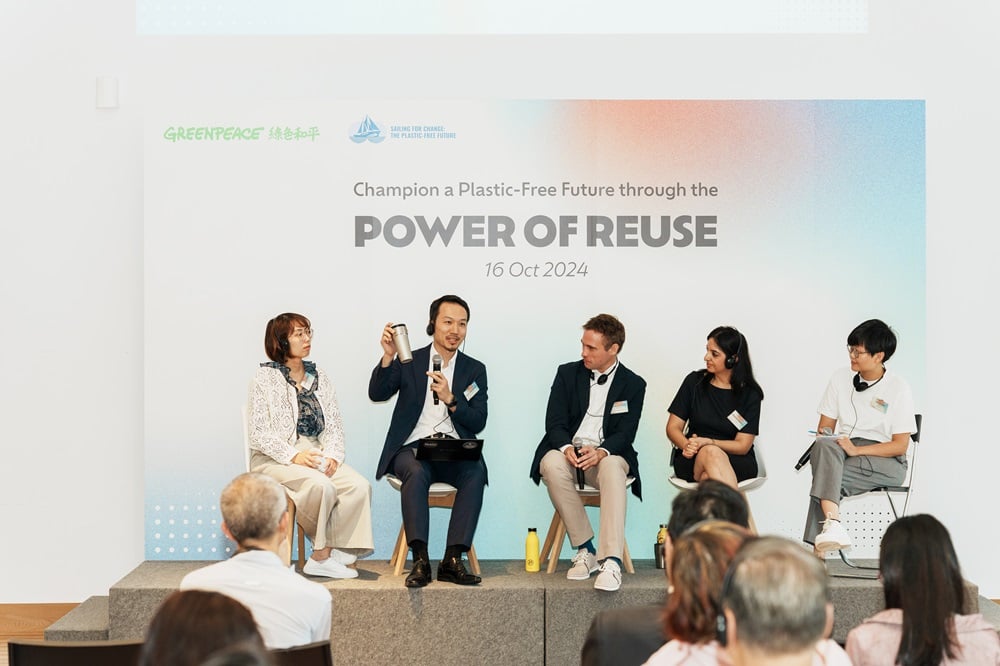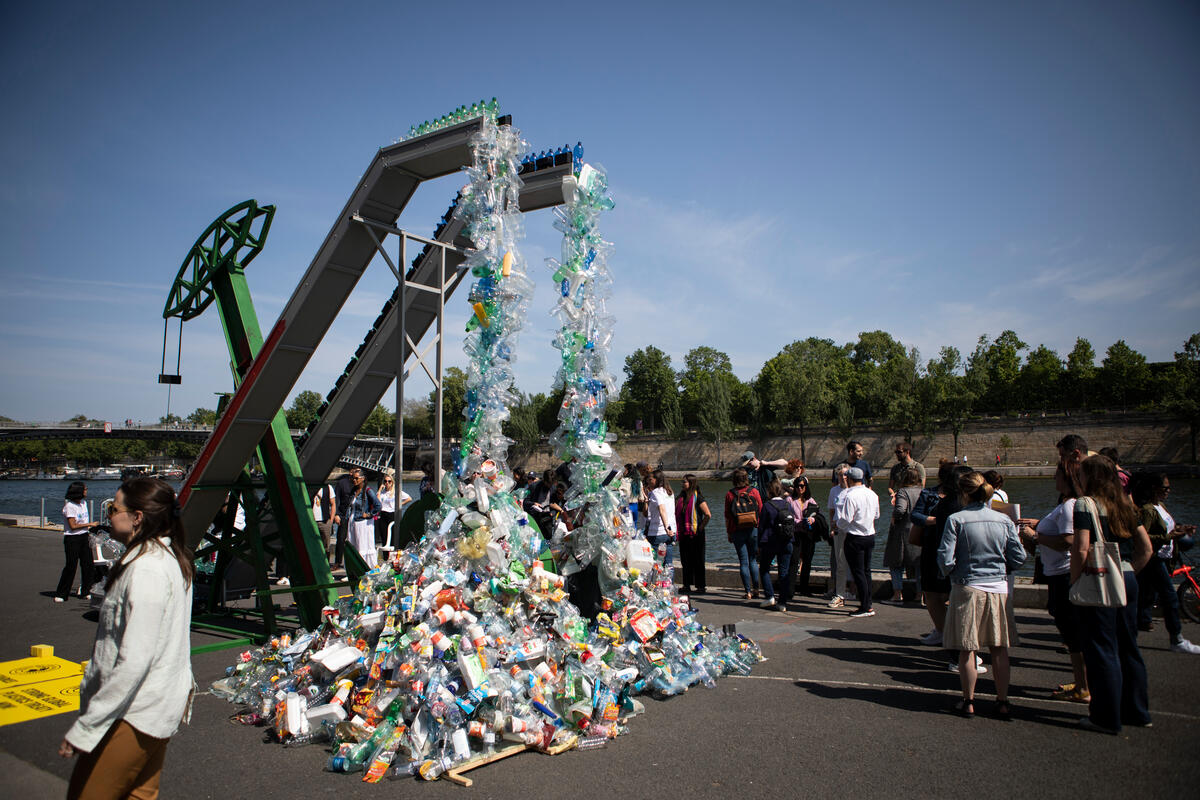Taipei, Taiwan, November 7, 2024 – Greenpeace East Asia released a “Plastic brand audit of East Asian River Bank”. The audit found that 90% of waste in these rivers is plastic. The analysis of brands behind plastic pollution reveals that Uni-President Enterprises, LOTTE, and Vitasoy International Holdings Ltd. are the top sources of branded plastic waste in Taiwan, South Korea, and Hong Kong, respectively. Each of these companies is a major local beverage brand owner. International brand Coca-Cola also appeared among the top three sources of branded plastic waste in each region.
Greenpeace East Asia Taipei , Seoul, and Hong Kong office conducted a regional audit in 2024, focusing on ecologically valuable and representative rivers in three locations. The rivers are the Tamsui River and Zengwen River in Taiwan, the Han River in South Korea, and the Lam Tsuen River and Pui O River in Hong Kong. The survey methods varied according to the characteristics of each river basin and accessibility. In Taiwan and Hong Kong, waste was collected, counted, and analyzed manually to identify brands. In South Korea, drone images combined with AI recognition were involved. More than 300 volunteers and activists participated in this collaborative investigation, examining a total of 31,250 pieces of waste, of which 28,481 items (91.1%) were plastic.
Cony Chang, project leader of plastic-free project in Greenpeace East Asia Taipei office, stated “One of the main challenges encumbering plastic reduction progress is the difficulty in identifying the plastic polluters. Although many countries have promoted bans and restrictions on single-use plastics(SUP) for years, waste produced in urban areas continues to flow downstream through rivers into oceans, further impacting human health and the water cycle.”
Research has estimated that rivers in Asia contribute over half of the world’s river-borne plastic waste. Ahead of the fifth meeting of the Intergovernmental Negotiating Committee(INC 5) of the Global Plastics Treaty. Greenpeace has collected data on types of river waste to urge beverage corporations to take responsibility for reducing plastic production.
According to the audit results from Taiwan, the most identifiable branded plastic waste comes from Uni-President Enterprises (19.3%), followed by Vitalon food company (7.5%), and international brand Swire Coca-Cola Limited (5.4%). Uni-President Enterprises, Taiwan’s largest beverage manufacturer, produces popular items including King of tea(茶裏王), Mine Shine(麥香), and Pure Tea(純喫茶). In addition, 7-Eleven, the largest convenience store chain in Taiwan with nearly 7,000 locations, is a part of Uni-President Enterprises.
In Hong Kong, the top three sources of branded plastic waste in rivers are Vitasoy International Holdings Ltd, Swire Coca-Cola, and AS Watson & Company Limited (Hong Kong). In South Korea, the leading sources are LOTTE, Swire Coca-Cola, and Dong-A Otsuka—each a major local beverage brand (see Table 1). Coca-Cola, the world’s largest beverage company, ranked in the top three in all three regions surveyed.
Chang said,
“In Taiwan, 2 out of every 10 identifiable PET bottles are from Uni-President Enterprises. These major brands must take immediate action to reduce plastic by shifting to reusable systems, and addressing their branded waste polluting rivers.” Chang emphasized that the government should play a key role in guiding beverage brands to adopt reusable models, with a clear timeline to help control plastic pollution.
Tina Chang, a volunteer who participated in river cleanup in Taiwan, shared her observations: “The government and companies need to take plastic pollution seriously and move toward reusable systems. As an environmentally conscious consumer, I also disagree with the sheer volume of plastic being produced,” she said.
River waste mainly consists of PET bottles, food packaging, and other single-use items. In Taiwan’s rivers, the most common items are PET bottles (34.8%), followed by polystyrene and other plastic packaging materials (17.5%), and single-use food packaging and utensils (16.4%). In Hong Kong, food packaging is the most prevalent (25.85%), followed by household items and packaging (16.71%) and beverage packaging (15.8%). In South Korea, polystyrene and similar plastic packaging materials are the most common (82.1%), with PET bottles second (15.3%).
Globally, PET bottles are among the most recycled plastics and are generally valuable as recyclable materials. However, they still rank among the top three types of river waste in each audited region. In Taiwan, the EPA claims a PET bottle recycling rate as high as 97%, PET bottles remain the largest category of plastic waste in rivers.
Chang emphasized:
“The example of PET bottles shows that relying solely on end-stage recycling is insufficient to solve plastic pollution. FMCG brands must reduce plastic production from the source by shifting to reusable systems to address the plastic crisis.”
Both in Taiwan and internationally, numerous examples already exist where beverages are sold in glass bottles with reverse logistics and deposit systems enabling refills. Coca-Cola, for instance, introduced refillable plastic bottles in the Latin American market in 2021, demonstrating that this approach is technically and commercially feasible. What’s needed now is for these FMCG brands to fully take responsibility and accelerate their transition to reusable models.
This joint survey was released before INC 5 of the Global Plastics Treaty, through a multilingual and English interactive website that publicly shares all survey data to advocate for a stronger Global Plastics Treaty.
Nara Kim, the project leader of the plastic-free project in Greenpeace Seoul office and a member of the Global Plastics Treaty negotiation team, stated:
“We need a strong plastics treaty with an ambitious production cut which is at least 75% by 2040 to stand a chance of keeping the 1.5°C temperature rise and to protect our health, our rights, our communities, and our environment.”
Excessive plastic production has led to uncontrolled plastic pollution, accelerating the planet’s “triple crisis” of climate change, environmental pollution, and biodiversity loss. This crisis threatens human health and worsens social and economic inequalities worldwide.
Kim stressed that governments and businesses around the world, especially the FMCGs, should take this regional audit seriously and start setting up a roadmap for switching SUP to reused-based solutions. They should also support the treaty with an ambitious production reduction goal.
Contact
Sidney Lai Communications Officer, Greenpeace East Asia Taipei, [email protected] +886-933-321014

-1.jpg)

